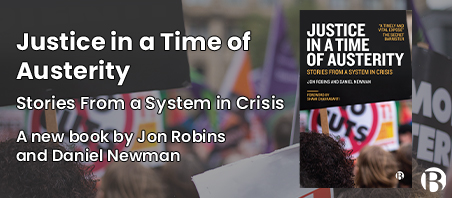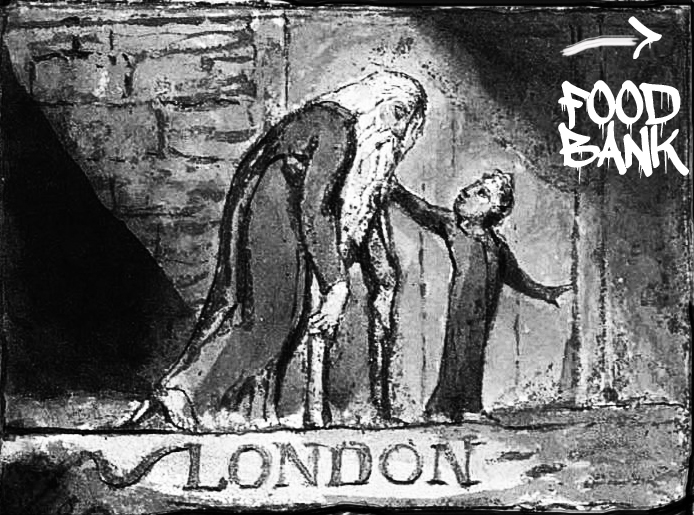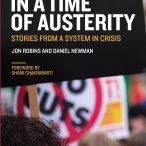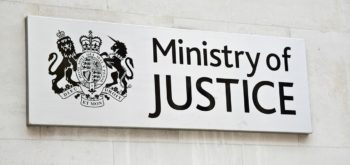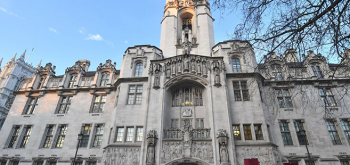A new study into the combined impact of austerity and the 2013 legal aid cuts on the justice system argues that ‘poverty and social inequality are entrenched through a failing justice system’ and that the denial of ‘access to justice’ all too often represents a catastrophic step in the life of that person and their family.
-
Join co-authors Jon Robins and Dan Newman at the launch of Justice in a time of austerity: stories from a broken justice system (Bristol University Press) on Thursday June 24 and purchase the book at a 30% discount. The launch is hosted by the Legal Aid Practitioners Group. Baroness Shami Chakrabarti as well as contributions from guest speakers – those working on the frontline who the authors met on their journey through the justice system.
-
Read about the launch of the project in September 2018 (here) and read about it in the Guardian and on Byline.
-
The Justice in a Time of Austerity project was a collaboration between Justice Gap editor and lecturer in law and criminology at Sheffield Hallam University Jon Robins and Dr Daniel Newman, a senior law lecturer at Cardiff University. The project was supported by the City law firm Ashurst and Garden Court Chambers through their special fund.
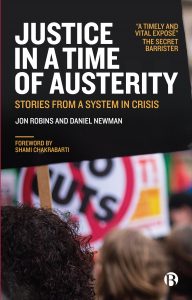 The cuts under the Legal Aid, Sentencing and Punishment of Offenders Act 2012, or LASPO represented biggest attack on our system of publicly funded legal advice largely removing social welfare law advice from legal aid and devastating an already struggling legal advice sector.
The cuts under the Legal Aid, Sentencing and Punishment of Offenders Act 2012, or LASPO represented biggest attack on our system of publicly funded legal advice largely removing social welfare law advice from legal aid and devastating an already struggling legal advice sector.
Over a 12-month period, starting October 2018, we interviewed people across England and Wales about their experiences of the justice system. Our book is about the state of ‘access to justice’, not legal aid. Many of the people we spoke to had never seen a lawyer, let alone received legal aid. Some would not be eligible. It is quite possible to be poor and not qualify for legal aid under the narrow terms of the means test. Even if they were eligible, they might not be able to find a lawyer or (most likely) their case would not have been covered by the post-LASPO scheme.
All too often the people we met were the ones that had fallen through the ‘justice gap’ and had no lawyers and no publicly funded legal help. As a result of the 2013 legal aid cuts, increasingly people were forced to navigate the justice system without help, and so we met people in venues such as court waiting rooms or in MPs’ surgeries as well as law centres, Citizens Advice bureaus and community advice agencies.
We conducted interviews in a range of settings: for example, a foodbank in a church hall in a wealthy part of London or a community centre in a former mining town in the Welsh valleys; a homeless shelter for rough sleepers in central Birmingham; and a destitution service for asylum seekers in a city on the South coast. We didn’t restrict our research to the obvious major conurbations; but we spent time in locations across the country from older industrial towns in the North blighted by the decline of manufacturing through to more disparate rural communities poorly served by public transport, let alone by the local advice sector and the courts.
It was a year defined by ‘austerity’. We met people caught up in the growing housing crisis, from Grenfell survivors to the homeless or the about-to-be-homeless; and others who had fallen victim to the so-called ‘hostile environment’, including a number of the ‘Windrush generation’ who had been denied access to benefits, lost jobs and even faced deportation. Some of our interviewees found themselves dependent on welfare benefits and foodbanks, often both. These were difficult lives made even more difficult by the chaotic roll-out of Universal Credit with its five-week wait for the first payment and punitive sanctions.
Our approach was to talk to people about what ‘access to justice’ meant to them, what was at stake for them and where they went for help; and then to interview those professionals who were there for them on the front line – if, indeed, anybody was there.
*
One theme of our book is the resourcefulness and commitment of those that remain working in social welfare law who have managed to serve their communities in the face of the advice sector’s own hostile environment. Many of the professionals we spoke to (legal aid lawyers, welfare rights advisers and volunteers) worked in law centres, Citizens Advice bureaus, advice agencies and law firms that have struggled to stay afloat in a sector that has been besieged by threats and challenges going back decades.
Politicians, aided by the media, have depicted legal aid lawyers as ‘fat cats’ for years. Insofar as there is any truth in that caricature, it did not apply to professionals working in the area of social welfare law. As we make clear, those that we interviewed could not fairly be accused of doing it for the money.
During the year of our research there was a two-week fact-finding mission to the UK by Philip Alston, the United Nations’ (UN) rapporteur on extreme poverty and human rights. According to his final report published in 2019, one in five people in the UK lived in poverty and close to four in ten children would do so within the next two years. Alston, an Australian human rights lawyer, invoked the 17th-century English philosopher Thomas Hobbes to say that their lives were likely to be ‘solitary, poor, nasty, brutish, and short’. He reported that ‘austerity’ politics, including the roll-out of Universal Credit, had contributed to the ‘systematic immiseration of millions’.
In striking but barely noted observation, Philip Alston identified the ‘dramatic rolling back’ of legal aid post LASPO as one of the causes of our country’s ‘systematic’ impoverishment. He was specifically talking about the impact of the 2013 legal aid cuts.
We agree.
*
Our book is about how poverty and social inequality are entrenched through a failing justice system. We illustrate this through our interviews, which offer illustrations as to how the denial of ‘access to justice’ often represents a catastrophic step in the life of that person and their family.
Reviews
- ‘This book should be a call to arms. If you are a tribune of the people who has ever poured scorn on “activist lawyers”, I dare you to read this. If you are a lawyer or even a concerned citizen who has never felt comfortable with the “activist” tag, it may just tempt you to reconsider.’
Baroness Shami Chakrabarti - ‘This important book chronicles the struggles of those excluded from the justice system and the difficulties of the professionals still trying to help. It issues a powerful case for change.’
Hannah Quirk, King’s College, London - ‘A timely and vital exposé of the pressures exerted upon our justice system by a decade of political neglect, giving a much needed voice to those who, as a result, have found themselves cut off from justice.’
Secret Barrister - ‘A journey through, and call-to-arms for, austerity Britain, where access to justice in housing, food, benefits, the right to remain and family life is denied through poverty, inequality – and design.’
Steve Tombs, The Open University - ‘Successive governments have been keen to emasculate challenge, and suppress the impoverished. Long before austerity, long before COVID 19, right up to the 2021 budget. No mention of justice let alone provision. This book has the history, has the contemporary narrative. It is the voice missing from the empty rhetoric of politicians and gives a stark measure of a society without due process.’
Michael Mansfield QC - ‘A much-needed addition to the literature on the devastation of austerity in the UK. This book sheds light on one of the most important – yet least highlighted – aspects of how austerity policies shattered lives and vital safeguards in our society: access to justice in the civil and family courts for people without means.’
Mary O’Hara, Author & Journalist - ‘The effects of COVID-19 have increased unemployment, poverty and evictions. Those without means need support to access justice. But this timely book shows there is no true equality of arms.’
Penelope Gibbs, Transform Justice
